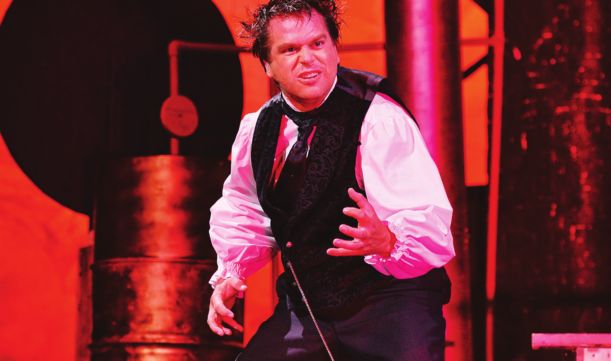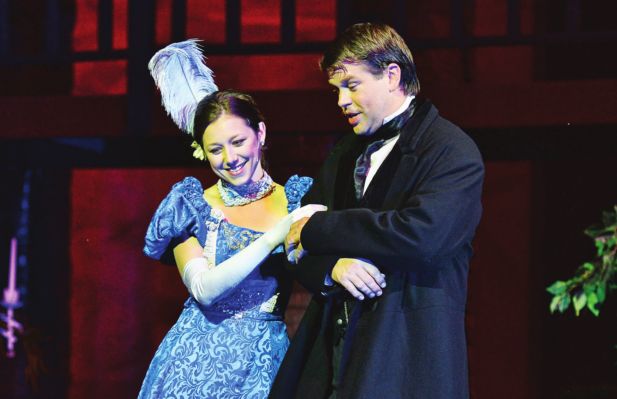
Jekyll & Hyde grapples with good and evil
THEATER | Patrick Yeagle
The mercurial weather on what would have been Jekyll & Hyde’s opening night at the Springfield Municipal Opera mirrored well the play itself. A violent, Hyde-like thunderstorm forced a cancellation of the Sept. 5 showing, but the following evening was calm and cool, with the nearly full moon hanging low over the stage, a fitting set piece for a play dealing with the complex nature of man.
The story of Dr. Henry Jekyll and Mr. Edward Hyde needs little introduction: Dr. Jekyll, a scientist and honorable man, seeks a way to quarantine man’s violent nature, but his experiments instead unleash the savagery hidden in his own heart. Set in Victorian England, the novella by Robert Louis Stevenson explores how both virtue and venom can inhabit the same person.
This is the first time the Muni has hosted Jekyll & Hyde: The Musical, directed by Laurie O’Brien. The play debuted in Houston, Texas, in 1990, and it later appeared on Broadway. The lyrics for The Muni’s rendition were written by Leslie Bricusse, a prominent English composer and playwright, while the score is provided by Frank Wildhorn, an accomplished American composer.
The stage adaptation of Jekyll & Hyde differs from the novella on several points.
The main story arc of Dr. Jekyll wrestling with his evil side, Mr. Hyde, remains, but the play adds a love triangle that dilutes Jekyll’s goodness as a character. Jekyll is engaged to marry Emma, the daughter of a wealthy and respected aristocrat, but he also begins to fall for Lucy, a good-hearted prostitute at a dive bar which Jekyll and his friend John Utterson visit for Jekyll’s bachelor party.
In the novella, Hyde’s inherent ugliness manifests itself in random attacks on whomever his path crosses. However, the play tones down Hyde’s villainy by having him instead attack the “hypocrites” who dared stand in the way of Jekyll’s experiments. The subtle change tends to infuse some of Jekyll’s righteousness into Hyde, making the contrast between the two less stark.
The play itself is grim, with only a few moments of comedic relief and an abrupt ending that offers little closure. The repertoire of songs also seems demanding, with sometimes awkward lyrics and unforgiving musical arrangements. Considering the dark tone of Jekyll & Hyde and the difficulty of its musical numbers, the director and cast at The Muni did well at taking on a challenging piece. Despite a few minor opening night gaffes, the play was intriguing and at times both playful and stunning.
Jekyll & Hyde: The Musical
When: Sept. 11-13 and Sept. 18-20, 7:30 p.m.
The Muni: 815 E. Lake Shore Drive, Springfi eld
Tickets: 793-6864 or online at themuni.org
D.J. Shultz of Springfield
plays both Dr. Jekyll and Mr. Hyde, offering righteous conviction as
Jekyll and unrestrained delight in evil as Hyde. Shultz really shines
when playing the bad side of the good doctor, contorting his face, voice
and posture to appear haunting and almost beastly.
Anna
Bussing of Springfield as Lucy offered the most emotionally raw and
powerful performance of the play, with a soaring voice that reverberates
with her character’s passion and loneliness. Her breathy delivery in
quiet moments of song gave Lucy a sultry disposition, but Bussing
fearlessly attacked higher notes that a lesser singer couldn’t have hit.
Alyssa
Phinney of Springfield is Emma Carew. Although her character seems
almost secondary in importance to Jekyll and Lucy, Phinney’s sweetly
innocent voice set Emma apart as the real embodiment of unadulterated
goodness in the story. Particularly impressive is Phinney’s duet with
Bussing in the second act, when their characters sing together longingly
and unknowingly about the same man, their voices gracefully
intertwined.
The
supporting cast and ensemble provided a solid backdrop against which the
stars could shine, but there were several numbers which gave the
ensemble a chance to dazzle, as well. In particular, the dance number in
the Red Rat tavern in Act I is bawdily entertaining, and there are
rounds sung throughout the show which must have taken an immense amount
of coordination and practice. Clever set changes disguised with
spotlighted monologues kept the viewer engaged even as the scenes
shifted in the background. The versatility of the set itself was
surprising.
While Jekyll & Hyde: The Musical doesn’t
leave the viewer inspired and uplifted, it does grapple with serious
questions of ethics, human nature and the limits of love – questions
that are as relevant and unanswered as they were when Robert Louis
Stevenson first published his novella in 1886. The Muni’s rendition
ambitiously stares those issues in the face and reminds the viewer that
the darker side of humanity lurks just below the surface.
Contact Patrick Yeagle at [email protected].
